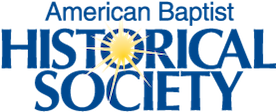Hudson, Marshall Papers
Dates
- Creation: 1886-1957
Conditions Governing Access
The collection is open for research. Unpublished manuscripts are protected by copyright. Permission to publish, quote, or reproduce must be secured from the repository and copyright holder. Staff may refuse copying of fragile or at-risk materials.
Materials may be accessed by request at the American Baptist Historical Society. For more information on accessing collections or obtaining copies, visit http://abhsarchives.org.
Biographical / Historical
Accessed 4 December 2018 from:
https://www.gordonconwell.edu/ockenga/baraca-philathea/
Baraca Philathea was an ecumenical movement designed to facilitate adult evangelism through Bible study. A million strong during the early twentieth century, it tried to bridge the gap that young people, aged sixteen to twenty-five, felt between their churches and their own experiences. Marshall Hudson, the movement's founder, was a successful business owner in Syracuse, New York, who made a name for himself selling crockery. Hudson had grown up in the church. Then, like most young people - especially young men - of his day, Hudson left the church behind as he focused on his career. In 1890, he and his pastor decided to help the young men of the city to avoid making the same mistake of leaving God behind. Hudson started the first Baraca class for men in his home church, the First Bapist Church in Syracuse.
The Baraca class at First Baptist Church met during Sunday school and studied the Bible together. Hudson gave his boys ownership of the class and began to provide activities that assisted the men in their physical and intellectual growth in addition to his central provision of spiritual food. In 1893, Hudson's eldest daughter, May Hudson, started a class for young women based on the same program and named it Philathea. The first Baraca class began with a membership of sixteen and before the year was over had a roster of more than 150. When other churches heard of the success of these classes, they wanted to use Hudson's ideas and apply them to their own churches. By the early 1900s there were Baraca and Philathea classes in every major Protestant denomination, in almost every state in the United States, and in Canada, Italy, England, India, and Japan.
Full Extent
.2 Linear Feet (6 folders, one volume)
Language of Materials
English
File Plan
Folder listing: Articles about M.A. Hudson, booklet on First Baptist of Syracuse New York; Book of Remembrance; Dining table bible clubs, constitution and by-laws and formation of Christian Endeavor in our church; Letters from Harriet Hudson Grubert to nephew Fred; Letters-M.A. Hudson; Photographs and postcards-Baraca Philathea Tower House in Mount Vernon Virginia, Grenell Island and Yacht Club Thousand Islands New York, Mapeh Dayal and Josephine Raipur India, Raipur district conference, group of Indian missionaries; Hudson's bible with handwritten notes throughout
Subject
- Hudson, Marshall A., 1850-1926 (Person)
- Language of description
- Undetermined
- Script of description
- Code for undetermined script
Repository Details
Part of the American Baptist Historical Society Repository
3001 Mercer University Drive
Atlanta GA 30341-4115 USA
678.547.6680
678.547.6682 (Fax)
ABHSoffice@ABHSarchives.org
